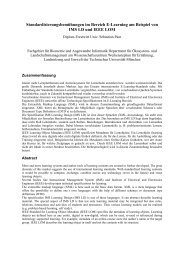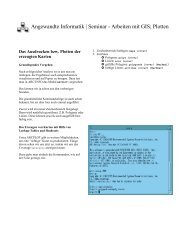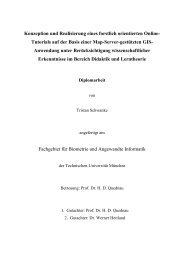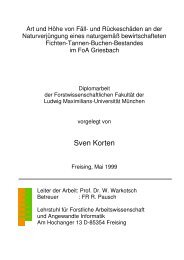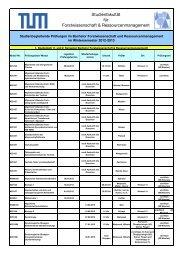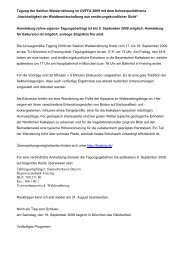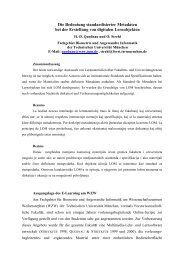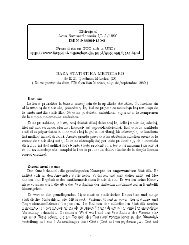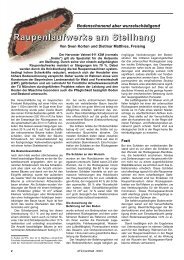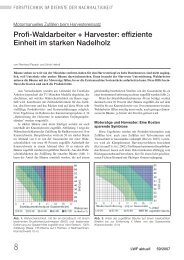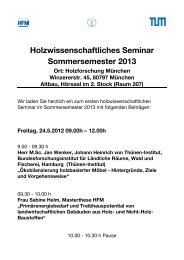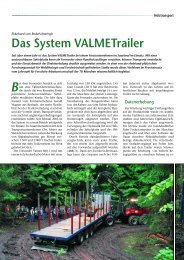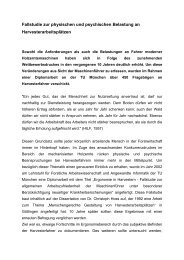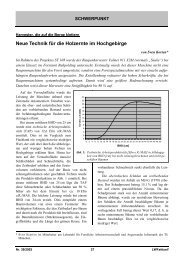Die Zypresse - Studienfakultät für Forstwissenschaft und ...
Die Zypresse - Studienfakultät für Forstwissenschaft und ...
Die Zypresse - Studienfakultät für Forstwissenschaft und ...
Create successful ePaper yourself
Turn your PDF publications into a flip-book with our unique Google optimized e-Paper software.
VOLUME III, ISSUE 2<br />
Look for these articles<br />
in this edition:<br />
• Bergwaldprojekt—what is it<br />
exactly?<br />
• What has LC Freising been<br />
up to<br />
• Do you know your North<br />
American tree species?<br />
• Who is your new Executive<br />
Board?<br />
Inside this issue:<br />
Editor’s Note 2<br />
SERM 2012 2<br />
Where Did All the Whitebark<br />
Pines Go?<br />
Bergwaldprojekt: A Week<br />
to Remember<br />
Calendar: What’s Up<br />
Next for IFSA<br />
LC Freising Happenings:<br />
What We’ve Been Doing<br />
Know Your Trees: North<br />
American Edition<br />
¿Cómo se dice...? 8<br />
International Forestry Students’ Associati on LC Frei si ng<br />
4<br />
4<br />
4<br />
5<br />
7<br />
<strong>Die</strong> <strong>Zypresse</strong><br />
Elections, Elections, Elections!<br />
On May 8th, LC Freising<br />
held its LC elections for<br />
the Summer Semester<br />
2012. Congratulations to<br />
the winners! To get to<br />
know your Executive<br />
Board a little better, each<br />
board member wrote a<br />
short introduction about<br />
him/herself.<br />
President, Max von<br />
Stern<br />
My<br />
name<br />
is<br />
Max<br />
von<br />
Stern<br />
and<br />
I’m<br />
in<br />
the<br />
2nd<br />
semester<br />
of the <strong>Forstwissenschaft</strong>en<br />
<strong>und</strong> Ressourcenmanagement<br />
program.<br />
Originally, I’m from Am-<br />
berg which is in the<br />
“Oberpfalz” part of Bavaria.<br />
When I´m at my<br />
hometown, I spend most<br />
of the time in nature, so I<br />
work in the garden,<br />
woods or go for a hunt.<br />
Of’ course, I try to meet<br />
old friends from my<br />
schooldays as often as<br />
possible.<br />
I became a member of<br />
IFSA almost from the<br />
beginning of my studies,<br />
so last year in October/<br />
November. As the new<br />
President of the LC Freising,<br />
I will try to offer you<br />
as many and good possibilities<br />
to get to international<br />
meetings as possible,<br />
thereby connecting<br />
you to the world. Just to<br />
give you a small preview<br />
of my plans, included is: a<br />
meeting with our Danish<br />
friends in Denmark, a<br />
meeting at the Oktober-<br />
Winter Meeting Slovenia 2012<br />
By: Maria Probst, Me Schulte, Jakob Hoerl, and Max von Stern<br />
We have never been to<br />
Slovenia before, or to any<br />
IFSA Meeting at all. We<br />
were all very excited, but<br />
luckily we had Jakob<br />
with us, who has now<br />
been to all four winter<br />
meetings in Slovenia. It is<br />
a lovely little country in<br />
between Italy, Austria,<br />
Hungary and Croatia. In<br />
one part of the country<br />
that we visited, was the<br />
border triangle of Slovenia,<br />
Hungary and Austria,<br />
and it was quite<br />
funny to stand at one<br />
time in three different<br />
18 June 2012<br />
fest where we invite IFSA<br />
world to join us, and more<br />
to come. Of course, I am<br />
open to all your ideas and<br />
questions. I’m looking<br />
forward to good team<br />
work with you guys and<br />
thank you for showing<br />
your trust in me by electing<br />
me!<br />
The funniest story about<br />
me and a tree was at the<br />
university. During the<br />
lecture of dendrology, we<br />
went aro<strong>und</strong> the faculty<br />
and had a close look at<br />
some trees. On our way,<br />
we fo<strong>und</strong> 10 almost alive<br />
Fraxinus Excelsior. My<br />
friends and I planted<br />
them in the parking lot. 9<br />
out of 10 are growing<br />
right now!<br />
(continued on page 3)<br />
countries. The capital city<br />
of Slovenia is Ljubliana<br />
with its beautiful little<br />
historic centre and the<br />
river Ljubljanica flowing<br />
through it, but it was not<br />
just a sight-seeing tour -<br />
we also learned many<br />
(continued on page 2)<br />
1
PAGE 2 DIE ZYPRESSE VOLUME III, ISSUE 2<br />
Slovenia (from page 1)<br />
important issues about forestry<br />
there. Aro<strong>und</strong> 60% of Slovenia’s<br />
surface is covered by forests, within<br />
which 10% is protected. In order to<br />
guard the forests and guarantee a<br />
sustainable economy, the government<br />
prohibited the clear-cutsystem.<br />
Instead of this, they are<br />
practicing the so called Close-to-<br />
Nature-Forestry (CTN) system.<br />
This is an irregular shelter wood<br />
system where single trees are selected<br />
to be cut down. CTN is a very<br />
sustainable system with a small<br />
ecological footprint, and furthermore,<br />
it is economically profitable.<br />
Slovenia also affords so many different<br />
places worth seeing. One of<br />
them is the Waterfall Rinka which<br />
is one of Europe’s highest - about<br />
According to dictionary.com, a forest<br />
is defined as “a large tract of<br />
land covered with trees and <strong>und</strong>erbrush.”<br />
Technically speaking then,<br />
we have forests in the desert, at<br />
least the Sonoran Desert in the<br />
southwestern United States because<br />
there are patches of land covered<br />
by mesquite trees (Prosopis<br />
sp.). When I joined IFSA last year,<br />
I thought to myself: I grew up in the<br />
Arrival at Zürich April 10, 2012:<br />
Day 1<br />
There are some Swiss people welcoming<br />
us at the hostel, feeding us<br />
with information about the city, the<br />
program, and the next meeting<br />
point. They are speaking a weird<br />
l a n g u a g e t h a t t h e y c a l l<br />
100 meters. There is also<br />
the wine region aro<strong>und</strong><br />
Lendava where we had<br />
the chance to taste some<br />
wine. And one event not<br />
to be forgotten: the international<br />
evening. Here<br />
every nation (we had 10<br />
different ones like Rumania,<br />
Austria, Canada,<br />
Turkey, Spain and others)<br />
participating at the<br />
winter meeting had a<br />
table with traditional<br />
food and many drinks. Of<br />
course somebody made the legendary<br />
Freske Fiske Snaps (maybe<br />
you can guess the content from its<br />
name…).<br />
desert, what sort of connection do I<br />
have to the forest besides the obvious<br />
uses? Then I remembered the<br />
mesquite thickets<br />
I used to see<br />
scattered<br />
throughout the<br />
landscape back<br />
home. Mesquite<br />
wood is great for<br />
grilling, adding a<br />
forest?”<br />
'Switzerdütsch'. They seem to be<br />
nice. Later that day, all SERM participants<br />
have gathered in a lecture<br />
room of ETH Zürich, listening<br />
thoughtfully to the '<strong>und</strong>erstanding-<br />
IFSA' introduction as well as to<br />
some professors of the forestry department.<br />
It follows an invitation<br />
for an apéro on the university's roof-<br />
All in all, it was a great experience<br />
and we really did enjoy our time in<br />
sLOVEnia!<br />
Forests in the Desert: A Word or Two from your Editor<br />
By: Will Meister<br />
“When I joined IFSA last year, I<br />
thought to myself, I grew up in<br />
the desert, what sort of<br />
connection do I have to the<br />
strong flavor to whatever is on the<br />
grill and can also be used to make<br />
exquisite furniture. The beans of<br />
mesquites are also delicious<br />
whether raw or<br />
gro<strong>und</strong> into flour for<br />
baking. As we bring<br />
you the latest edition<br />
of <strong>Die</strong> <strong>Zypresse</strong>, please<br />
remember, forests are<br />
all aro<strong>und</strong>.<br />
Southern European Regional Meeting (SERM) 2012<br />
By: Sandra Baumgardt and Louisa Wong<br />
top. Cheese, chips and wine – Swiss<br />
hospitality is approved.<br />
Day 2<br />
Ütliberg, a unique and beloved destination<br />
for recreation just next to<br />
Zürich, management of such a forest<br />
can be extremely challenging,<br />
(continued on page 5)<br />
2
VOLUME III, ISSUE 2<br />
Elections (from page 1)<br />
Vice-President, Sebastian Rassel<br />
My name is Sebastian, and I’m the<br />
new Vice-<br />
President of<br />
LC Freising<br />
in SS 2012.<br />
I’m in the<br />
fourth semester<br />
of the<br />
Bachelor in<br />
Forestry and<br />
Resource<br />
Management.<br />
Originally, I<br />
am from<br />
Westphalia, which is in the northwest<br />
of Germany.<br />
I’ve been an active IFSA-Member for<br />
two years now, participated in several<br />
international meetings and always<br />
had a lot of fun with IFSA - both on<br />
international and local levels.<br />
I like to spend my free time outdoors,<br />
holding discussions with different people,<br />
organizing barbecue and game<br />
events, listening to old style<br />
“bündische” music, and doing a lot of<br />
other stuff.<br />
As Vice-President, I will try to help<br />
out our new President and stay in<br />
close touch with our old partner-LC in<br />
Copenhagen as well as our new one,<br />
which will be designated this August.<br />
Treasurer, Alina Kasten<br />
I’m the new<br />
Treasurer for<br />
the summer<br />
semseter<br />
2012 and<br />
wanted to<br />
introduce<br />
myself to all<br />
of you. My<br />
name is Alina<br />
Kasten, and<br />
I’m in the<br />
second<br />
semester of the B.Sc. Forestry and<br />
Resource Management. Originally,<br />
DIE ZYPRESSE<br />
I’m not from Bavaria, but I’ve lived<br />
here for almost four years now and I<br />
have no intention of leaving anytime<br />
soon. I come from northern Germany,<br />
Hannover to be exact and it was<br />
quite a change for me to move that<br />
far away.<br />
I’ve been with IFSA ever since I<br />
started studying last winter and so<br />
far it’s been a lot of fun. I’m looking<br />
forward to taking part in more IFSA<br />
events because last year I didn’t have<br />
the time to do it.<br />
As the Treasurer, I will of course<br />
take care of the LC’s money<br />
responsibly and keep the books up to<br />
date. I will also give a financial<br />
report every semester to keep all<br />
members up to date.<br />
Secretary, Fabian Hofmann<br />
I'm your designated secretary for this<br />
semester.My name is Fabian<br />
Hofmann and I'm lucky to be born<br />
and raised in the nicest part of<br />
Bavaria - Lower Franconia.<br />
Unlike most LC members, I'm<br />
studying Forestry Engineering at the<br />
HSWT. I'm in my 4th semester now.<br />
In my leisure time, I really enjoy<br />
music, doing different nerdy stuff,<br />
and outdoor activities (foremost<br />
mountain-biking).<br />
I became an IFSA member last<br />
Autumn and as your secretary, my<br />
goal is to keep it simple and keep it<br />
going.<br />
You should have access to the data<br />
you need and not be confused. If you<br />
have a concern please let me know.<br />
My tree story is rather pensive than<br />
funny: Last winter I worked together<br />
with some lumberjacks.<br />
After cutting down one tree, a big<br />
oaken branch fell down right next to<br />
me.<br />
If I was standing just 1 meter in<br />
that direction it would have hit me<br />
straight on the head.<br />
From this day on, I was even more<br />
aware of what an exhausting and<br />
dangerous job these guys do.<br />
They risk their lives every working<br />
day - but don't get paid properly for<br />
that risk.<br />
As most of us will work in leading<br />
positions later on, I really urge you<br />
to pay them the respect (and<br />
money) they deserve.<br />
Newsletter Editor, Will Meister<br />
I‘m Will, your new newsletter<br />
editor. Currently, I‘m in the second<br />
semester of the Master in<br />
Sustainable Resource Management<br />
program and am focusing on<br />
sustainable agriculture and water<br />
and soil management. Originally, I<br />
hail from a small town on the U.S./<br />
Mexico border called Yuma in the<br />
state of Arizona. When at home, I<br />
enjoy spending time with my family<br />
and working outdoors in the yard.<br />
I joined IFSA last semester after<br />
Urs gave a presentation about it<br />
because I wanted to find out more<br />
about forests (until now I‘ve spent<br />
my entire life in the desert). This<br />
semester I hope to incorporate new<br />
ideas into the newsletter, your<br />
ideas, and provide you with a<br />
newsletter that is fun, refreshing,<br />
(continued on page 4)<br />
3<br />
PAGE 3
PAGE 4 DIE ZYPRESSE VOLUME III, ISSUE 2<br />
Elections (from page 3)<br />
and a good read. My funny<br />
experience with a tree was trying to<br />
From the 15 th to 21 st of April 2012,<br />
15 LC members had the possibility<br />
of taking part in another Bergwaldprojekt<br />
(BWP). However, this year<br />
was going to be special. We invited<br />
our LC Partner, LC Kopenhagen,<br />
to participate as well since the Harz<br />
is at a convenient distance both<br />
from Freising and Copenhagen.<br />
Just for explanation: Bergwaldpro-<br />
slide down the trunk of a tree when<br />
I was about 7 year old because I<br />
jekt is a project, fo<strong>und</strong>ed in 1987 by<br />
Renato Ruf and Wolfgang Lohbeck<br />
to organize volunteers that want to<br />
help by planting<br />
trees or doing<br />
other jobs like<br />
fence-building<br />
and land recultivation.<br />
LC Freising<br />
had already<br />
visited a<br />
thought it was like a fireman‘s pole.<br />
It wasn‘t, in case you‘re wondering.<br />
Where Did All the Whitebark Pines Go?<br />
By: Will Meister (summarized from Scientific American “Environmentalists Sue to Declare Whitebark Pine<br />
Endangered” http://www.scientificamerican.com/article.cfm?id=endangered-pine<br />
The Whitebark Pine (Pinus albicaulis),<br />
native to the mountainous<br />
regions of the Western United<br />
States and Canada, is facing what<br />
some feel could be the beginning of<br />
the end.<br />
Climate change, some believe, is<br />
the culprit in the disappearance of<br />
this species. With warming temperatures,<br />
the Whitebark Pine’s<br />
alpine range is dealing with a<br />
flurry of changes. White Pine Blis-<br />
Internationally, these events are on<br />
IFSA’s calendar. Are they on yours?<br />
More information available at<br />
www.ifsa.net/events.<br />
19th European Foresters’ Orienteering<br />
Championships (19th<br />
EFOL)<br />
31/7—4/8/2012 in Druskininkai,<br />
ter Rust (introduced from Europe)<br />
infestations and mountain pine<br />
beetle outbreaks have increased<br />
because of changing precipitation<br />
patterns and warmer winter<br />
weather. Fire-suppression measures<br />
are also likely playing a role<br />
in the sharp decrease in Whitebark<br />
Pine numbers. In certain parts of<br />
the Pine’s range, up to 80 percent<br />
of the trees have died from one or a<br />
combination of these factors.<br />
Bergwaldprojekt: A Week to Remember<br />
By: Alina Kasten<br />
Calendar: What’s Up Next for IFSA<br />
Keeping you informed<br />
Lithuania<br />
Do some outdoor sports with your<br />
fellow foresters and learn about<br />
forestry in Lithuania.<br />
40th International Forestry Students’<br />
Symposium (IFSS)<br />
1/8-15/8/2012 in Turkey<br />
“Bergwaldprojekt is a project...to<br />
organize volunteers that want to<br />
help by planting trees or doing<br />
other jobs…”<br />
Environmental groups in the<br />
United States are currently fighting<br />
to list the Pine as an endangered<br />
species but have run into<br />
resistance from the U.S. Fish and<br />
Wildlife Service.<br />
Whitebark Pines play an important<br />
role in the high mountain ecosystem<br />
as they provide food and shelter<br />
for many different animals. The<br />
Pine also acts as a pioneer species,<br />
playing an important role in habitat<br />
creation.<br />
Bergwaldprojekt in the autumn of<br />
2011, and since we really had a lot<br />
of fun on that occasion, we thought<br />
it would be a great<br />
idea to help out on another<br />
project.<br />
The first meeting with<br />
the Danish was rather<br />
exciting, as most of us<br />
(continued on page 6)<br />
Probably the biggest gathering of<br />
forestry students from all over the<br />
globe. Get to know your counterparts<br />
from other countries while<br />
enjoying the deliciousness of Turkish<br />
food and learning about Turkish<br />
forestry. IFSA will also be holding<br />
its 23rd General Assembly during<br />
this time.<br />
4
especially because a larger diversity of<br />
people would like to take part in the<br />
decision making. The SERM delegation<br />
learns about this during two<br />
speeches by the university staff who<br />
work in the research forest, and a forest<br />
tour is included. Although it is<br />
raining all the time, the Swiss organizing<br />
committee manages to motivate<br />
us to run about the forest for at least<br />
three hours in small groups. Nobody<br />
gets lost, everybody gets wet. After<br />
drinking some Rivella everybody feels<br />
good. Next stop: Lac de Neuchâtel.<br />
Day 3<br />
We are in the mountains now. There<br />
is some snow lying aro<strong>und</strong>. The forester<br />
of Jaun, Canton Fribourg, invites<br />
us to explore the area and explains<br />
more about the role of the forest<br />
as a 'protection forest.' We see a<br />
helicopter carrying wood from a steep<br />
slope to another place from where it<br />
can be transported further. The procedure<br />
is amazing to see. This very expensive<br />
method of logging can only<br />
work with subsidies from the state,<br />
aiming at ensuring the security of the<br />
area. Another less expensive method<br />
that is used in Jaun as well is called<br />
cable logging. The wood is transported<br />
from the slope by a cable car. The<br />
mayor of the city nearby invites us for<br />
lunch and entertains us with some<br />
traditional accordion music. In a small<br />
museum, we learn about the making<br />
of the famous Gruyère cheese. The<br />
day ends in Charmey, where the local<br />
forester explains about the special<br />
heating of the village that works with<br />
wood chips.<br />
Day 4<br />
VOLUME III, ISSUE 2<br />
SERM (from page 2)<br />
On Friday, we visit the mountain re-<br />
Elections and Statutes<br />
Of course, we held our elections for<br />
the Summer Semester, but we also<br />
had our General Meeting, where we<br />
DIE ZYPRESSE<br />
gion “Wallis.” The topic is protection<br />
forest. We visit a protection forest<br />
which was burned by fire some years<br />
ago and see some of the problems<br />
and difficulties of its recovery. This<br />
forest above Leuk in the Canton of<br />
Wallis burnt to the gro<strong>und</strong> in a single<br />
night on August 13, 2003. It was<br />
the largest forest fire in Switzerland<br />
in the last 30 years.<br />
In the evening, we sample the traditional<br />
food and drinks of this amazing<br />
region, where people are very<br />
kind, honest, hospitable, generous<br />
and sometimes as rough as the rocks<br />
aro<strong>und</strong> them. We spend a wonderful<br />
evening in a family-run vineyard and<br />
have some fine wine and cheese. At<br />
night we have this IFSA tradition<br />
known as the “international evening,”<br />
where each country’s representatives<br />
present their own schnapps<br />
and food from their homeland. This<br />
is a nice evening where you can taste<br />
over 10 countries’ delicacies in one<br />
night!<br />
approved a new set of statutes.<br />
They are stored in the Dropbox.<br />
Day 5<br />
This day our destination is Emmental,<br />
where local foresters show us a<br />
traditional forest management<br />
method with no clear cutting and a<br />
particular tree species composition<br />
called “Plenterwald”. Additionally,<br />
they tell us about the construction<br />
of wooden bridges in the region. The<br />
oldest one, “The Horben Bridge,”<br />
was built in 1834, and it is amazing<br />
to see that it still functions very<br />
well even with heavy loads of buses<br />
and trucks.<br />
In the evening we travel back to<br />
Zürich and it’s time to say goodbye.<br />
A great time was shared during<br />
these 6 days with IFSA members<br />
from the southern part of Europe.<br />
The organizing committee OC<br />
Zürich is a great team, and they<br />
showed us what Swiss hospitality<br />
means. We are also amazed by the<br />
charm of the mountains, multifunctional<br />
forests in tune with nature,<br />
and with local traditions –<br />
cheese, chocolate, and wine!<br />
LC Freising Happenings: What We’ve Been Doing<br />
Presentations<br />
IFSA members have been busy giving<br />
presentations this semester. Partici-<br />
(continued on page 7)<br />
5<br />
PAGE 5
PAGE 6 DIE ZYPRESSE VOLUME III, ISSUE 2<br />
Bergwaldprojekt (from page 4)<br />
hadn’t had a chance to meet any of<br />
them and it was quite clear that we<br />
would get along well.<br />
Finally arriving at the cabin, where<br />
we would be staying, after a long<br />
day of travelling, we enjoyed our<br />
vegetarian dinner and had a little<br />
introduction ro<strong>und</strong> with the<br />
Bergwaldprojekt organizers Volker<br />
and Henning, who would guide us<br />
through all the tasks this week,<br />
together with Cien and Sebastian,<br />
two interns, and Anna, our cook.<br />
After overcoming the language barrier<br />
of having to speak English, conversation<br />
between all parties involved<br />
flowed quite smoothly and by<br />
the end of the week it seemed like<br />
we’d known each other for forever.<br />
Our days always started in the<br />
same manner. We were woken up at<br />
6 am and after breakfast, aro<strong>und</strong><br />
7:30 am, we lined up next to the two<br />
busses that would take us to our<br />
working locations. The task for this<br />
week was mainly to plant beeches<br />
<strong>und</strong>er the protective cover of spruce<br />
trees somewhere along the outer<br />
zone of the Nationalpark Harz.<br />
To plant the approximately 30-50<br />
cm tall ‘trees’, we used a tool similar<br />
to the planting mattock<br />
(“Wiedehopfhaue”), and after a bit<br />
of practice, we got the hang of<br />
planting the beeches. With the<br />
weather on our side, we enjoyed<br />
relative warmth <strong>und</strong>er the shade of<br />
the trees and beautiful sunshine<br />
whenever we stopped for a break.<br />
Of these we had two, one afterbreakfast<br />
break aro<strong>und</strong> 10 am and<br />
a lunch break aro<strong>und</strong> 12 pm. These<br />
were a welcome change from the<br />
monotonous work and provided us<br />
with the chance to talk, exchange<br />
experiences, and deepen our friendships<br />
with the Danes as well as<br />
with the BWP organizers. The longest<br />
stretch always seemed to be the<br />
afternoon, when the fingers slowly<br />
began to ache a little bit and the<br />
knees started complaining when<br />
you’ve kneeled down on a stone for<br />
the h<strong>und</strong>redth time. This however<br />
faded far into the backgro<strong>und</strong>, when<br />
one just looked aro<strong>und</strong> to actually<br />
see the work they’d accomplished by<br />
now, and since we only had to work<br />
as hard as we could with no set pace<br />
or amount of trees we had to plant,<br />
the atmosphere stayed relaxed and<br />
work-friendly.<br />
Aro<strong>und</strong> 5 pm in the afternoon the<br />
bus came back to collect us and a<br />
happy, but very tired and dirty<br />
looking group befell the cabin<br />
shortly afterwards and the storm to<br />
the showers began. I was told that<br />
the last BWP in autumn of last year<br />
didn’t even have hot showers, so we<br />
considered ourselves very lucky to<br />
have several showers and hot running<br />
water.<br />
The next thing we looked forward to<br />
now was dinner and afterwards a<br />
more or less relaxed evening. Dinner<br />
was always vegetarian, cooked<br />
by Anna, with local and mostly organic<br />
ingredients. Her cooking was<br />
very good and in my opinion the<br />
dessert was always the highlight.<br />
After dinner we<br />
partook in the<br />
activities any<br />
group of young<br />
people would<br />
think of when<br />
left unattended<br />
at a ski cabin<br />
after working<br />
hard all day. And yes, that included<br />
drinking alcohol, but thankfully we<br />
were all responsible enough to not<br />
overdo it so we could be ready for<br />
the next day. However, we also<br />
played some fun group games, including<br />
things like memory and one<br />
evening we even sat together and<br />
sang songs, accompanied by a guitar.<br />
“After dinner we partook in the<br />
activities any group of young<br />
people would think of when left<br />
unattended at a ski cabin after<br />
working hard all day.”<br />
As I mentioned before, most days<br />
were the same routine, planting<br />
beeches. There were, however, some<br />
days where we would do something<br />
entirely different, and I think I can<br />
speak for all participants when I<br />
say, we were highly grateful for it.<br />
As much fun as planting beeches is,<br />
after the one h<strong>und</strong>redth tree, it can<br />
get a little repetitive. So one day we<br />
set out to put up fences and plant<br />
small birch trees inside. With our<br />
minds and hands feeling refreshed,<br />
we didn’t even mind going back to<br />
planting beeches <strong>und</strong>er the spruce<br />
once again on the last day.<br />
I’m mentioning this day in particular<br />
because firstly, we only worked<br />
until noon, and secondly, it showed<br />
how much of a team we had become.<br />
Usually everyone just plants by<br />
himself or herself, and you’re not<br />
quite close enough to carry on a decent<br />
conversation. When you run<br />
out of plants, you ask the people<br />
aro<strong>und</strong> you for some before you go<br />
get new ones. On the last day however,<br />
we really wanted to finish the<br />
batches of plants we had opened<br />
and instead of everyone working by<br />
themselves and finishing up after<br />
they were done, we became a team<br />
and while one half dug the holes,<br />
the other half planted.<br />
It made me realized<br />
how close we were and<br />
how much we’d grown<br />
together in this past<br />
week.<br />
Besides trying to find<br />
different tasks for us,<br />
the BWP organizers<br />
also arranged other things for us.<br />
For instance, we visited an old<br />
mine, and on another day, we hiked<br />
through the core zone of the national<br />
park, guided by one of the<br />
rangers. Both events were really<br />
interesting and we’re all glad we<br />
went.<br />
After a whole week of spending so<br />
much time so closely together, it<br />
was of course hard to part again<br />
and we all left with the promise to<br />
(continued on page 7)<br />
6
VOLUME III, ISSUE 2<br />
Happenings (from page 5)<br />
pants of the Bergwaldprojekt, SERM,<br />
and Winter Meeting all gave presentations<br />
about their experiences. We also<br />
been treated to two workshops by Urs<br />
on motivation and time management.<br />
In a new presentation series about<br />
forestry in your home country, Ping-<br />
Lian educated us all about forestry in<br />
Taiwan, and her country’s dependence<br />
on imported forest products. This<br />
presentation was followed-up by<br />
Gerard the following week with his<br />
introduction to forestry in South Africa.<br />
We all learned about South Africa’s<br />
reliance on non-native tree species<br />
for forestry and the land reform<br />
his country is currently <strong>und</strong>ertaking.<br />
Other projects are also <strong>und</strong>erway, including<br />
another Bergwaldprojekt, an<br />
Oktoberfest gathering, and various<br />
return one day and to keep in close<br />
contact with one another. Since<br />
both the encounter with our lovely<br />
LC-partner and the BWP project<br />
other fun<br />
activities.<br />
We hope<br />
you will<br />
join us! We<br />
meet every<br />
Tuesday<br />
at 6 pm 1.<br />
in the<br />
Forestry<br />
building.<br />
DIE ZYPRESSE<br />
Know Your Trees: North<br />
American Edition<br />
Here’s you chance to test your forestry skills and see if you<br />
can identify these North American tree species. The answers<br />
appear below. No cheating!<br />
3. 4. 5.<br />
Images from C. S. Sargent's "The Silva of North America", 1891 as on forestry.about.com<br />
Answers: 1. Flowering Dogwood (Cornus florida) 2. Black Locust (Robina pseudoacacia) 3. American Elm (Ulmus<br />
Americana) 4. American Sycamore (Platanus occidentalis) 5. Southern Magnolia (Magnolia grandiflora)<br />
Bergwaldprojekt (from page 6)<br />
ended so well, I too hope that I can<br />
one day join another event like this<br />
and for all others who plan to participate<br />
in the BWP, I strongly rec-<br />
2.<br />
ommend it because it is a unique experience<br />
that is sure to promise a lot<br />
of fun despite all the work we did.<br />
7<br />
PAGE 7
INTERNATIONAL FORESTRY STUDENTS’<br />
ASSOCIATION LC FREISING<br />
<strong>Studienfakultät</strong> <strong>Forstwissenschaft</strong> <strong>und</strong><br />
Ressourcenmanagement<br />
Hans-Carl-von-Carlowitz-Platz 2<br />
85354 Freising<br />
Editor: Will Meister<br />
Phone: 0176.613.45.686<br />
E-mail: ifsafreisingnews@googlemail.com<br />
www.ifsa.net<br />
To celebrate the internationality of<br />
our LC, this section will feature<br />
words and phrases written by our<br />
members in the languages they<br />
know, so that we can all learn a<br />
little something.<br />
I’ll be starting this new tradition off<br />
with some, hopefully, new American<br />
phrases that you have never heard<br />
before.<br />
As happy as a clam = very happy<br />
and content<br />
Back to the drawing board =<br />
start again on a plan after the failure<br />
of an earlier attempt<br />
Barking up the wrong tree =<br />
making a mistake or false assumption<br />
in something you are trying to<br />
achieve<br />
Do you have an idea for an article? Do you have<br />
comments about the newsletter? Please let us<br />
know at ifsafreisingnews@googlemail.com.<br />
Der IFSA Freising Newsletter ist <strong>für</strong> die Auswahl der<br />
Artikel verantwortlich. <strong>Die</strong> Redaktion behält sich daher<br />
das Recht vor Artikel zu akzeptieren oder abzulehnen<br />
<strong>und</strong> <strong>für</strong> die Veröffentlichung zu modifizieren, ohne den<br />
Inhalt <strong>und</strong> die persönliche Meinung des Verfassers zu<br />
schädigen bzw. zu verfälschen. Verfasser behalten<br />
volles Urheberrecht <strong>für</strong> die in diesem Newsletter veröf-<br />
fentlichten Artikel.<br />
** Meetings are held every Tuesday at 6 pm in<br />
the Forestry building **<br />
¿Cómo se dice...?<br />
By: Will Meister with help from http://www.phrases.org.uk/meanings/american-phrases-and-sayings.html<br />
The bee’s knees = excellent; the<br />
highest quality<br />
Brownie points = a notional mark<br />
of achievement, or kudos for performing<br />
some credible act<br />
Close, but no cigar = fall just<br />
short of a successful outcome and<br />
get nothing for your efforts<br />
Double whammy = a double blow<br />
or setback<br />
Fancy-pants = overly elaborate,<br />
swanky, or pretentious—especially<br />
of dress<br />
Get down to brass tacks = engage<br />
with the basic facts or realities<br />
Get your goat = make you annoyed<br />
or angry<br />
The heebie-jeebies = a feeling of<br />
anxiety, apprehension, or illness<br />
In the bag = virtually secured—as<br />
good as in one’s possession<br />
The whole kit and caboodle = a<br />
collection of things<br />
The life of Riley = an easy and<br />
pleasant life<br />
No dice = a refusal to accept a<br />
proposition<br />
Pie in the sky = a promise of<br />
heaven, while continuing to suffer<br />
in this life<br />
Run of the mill = the ordinary,<br />
basic article, with no decoration or<br />
augmentation<br />
The Real McCoy = the real<br />
thing—not a substitute<br />
8



